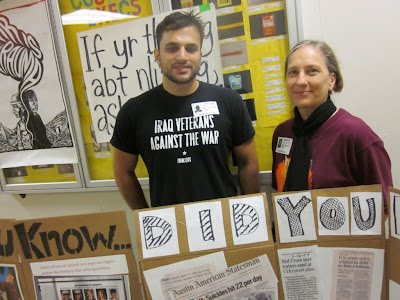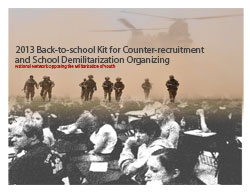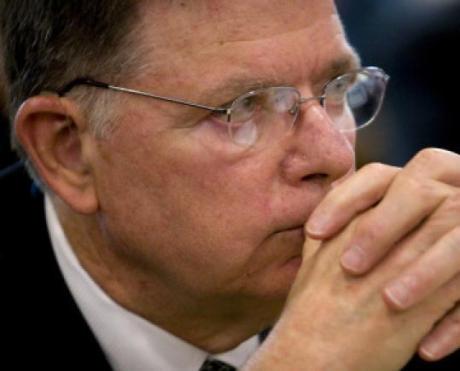Nick Haggerty -
Uncle Sam may or may not be watching you while you sleep
 I started receiving recruitment emails from a Marine captain with the clockwork regularity characteristic of the military in the beginning of my first semester at Fordham. The Marine captain was vague on most details, but he explicitly listed the benefits of enlisting in colloquial English: “There is no obligation on behalf of the student. You attend during the summer, you get paid. You’ll return to school knowing you have a job opportunity waiting at graduation (15?, 16?) if you wish to accept your commission.” I could easily picture myself without a summer job, and therefore deciding to spend a few weeks in Officer Candidates School in Quantico, Virginia seemed appealing. I did not intend to enlist in the Marines, but if they were willing to pay me to go to this training school, the idea of attending did not seem ridiculous. I never considered unsubscribing from the emails, let alone doing anything about the military’s privileged access to students.
I started receiving recruitment emails from a Marine captain with the clockwork regularity characteristic of the military in the beginning of my first semester at Fordham. The Marine captain was vague on most details, but he explicitly listed the benefits of enlisting in colloquial English: “There is no obligation on behalf of the student. You attend during the summer, you get paid. You’ll return to school knowing you have a job opportunity waiting at graduation (15?, 16?) if you wish to accept your commission.” I could easily picture myself without a summer job, and therefore deciding to spend a few weeks in Officer Candidates School in Quantico, Virginia seemed appealing. I did not intend to enlist in the Marines, but if they were willing to pay me to go to this training school, the idea of attending did not seem ridiculous. I never considered unsubscribing from the emails, let alone doing anything about the military’s privileged access to students.
There was no “Aha!” moment that led to my decision to do something about these recruitment emails. Maybe it was the same attitude of self-interest and self-protection I had in considering the Marine captain’s monetary offer that prompted me to wonder about how they acquired my contact information. This initial questioning of how the Marines obtained my contact information led me back to more scrutiny of the content within these emails. The more closely I read them, the more unsettled I became with the Marine captain’s promises of economic freedom and self-actualization. By the time I received the January recruitment email, it was clear to me that these emails instill fear and anxiety and exploit the vulnerabilities of me and my peers, in order to promote enlisting as a Marine. The fears, rational and irrational, of not having a job or even a purpose after graduation are real thoughts that can stoke anxiety in me and in other undergraduate students. The recruitment emails reinforce these fears of finding a job and direction in life by presenting a clear-cut solution to both problems: enlisting in the Marine Corps.
I decided to act on this issue. I wrote to both the Marine captain and the freshman Dean in late January to find out how the Marines obtained my contact information, and to make known my disapproval of the recruitment emails’ content: “If an organization, such as the Marine Corps, has the blessing of Fordham to recruit its students by directly, and repeatedly, contacting them, why are non-military public service organizations not granted this privilege as well? Would you not agree that one could find ‘pride and purpose’ through non-military public service?” I never received a response from the Marine captain. After calling and going directly to my Dean’s office, another Dean contacted me a few weeks later to address my privacy concerns. He referred me to the Solomon Amendment of 1996, which is a federal law under which Fordham is required to provide directory information to recruiters such as the Marine captain that was contacting me. The Dean did mention that I could request to be omitted from the lists provided to recruiters, but that would prevent Fordham from communicating with my parents or anyone else. At this point, I began asking my friends about how I should respond to this roadblock.
A response I sometimes hear from peers when I tell them about this situation is: If you don’t want to get emails from the Marines, just unsubscribe or tell them to stop. Why does it bother you if other students, who may be interested in enlisting, receive these emails? My problem with the Marines sending these emails to Fordham students is twofold. First, there are undoubtedly risks inherent in sharing student information to any military organization that makes a request. What limits do the Marines have on sharing student information with other military and non-military organizations? What information, besides email, is also readily available to these recruiters? Oftentimes, students do not realize that their information has been given out with their implicit permission until a recruiter contacts them. While this action is apparently legal, I believe that assuming a student’s permission to give away contact information is not an ethical practice and a violation of a reasonable expectation of privacy. Students should be able to opt-into this system, if they choose, and not be stuck with opting out when it is too late.
Second, and perhaps paramount, are the recruitment actions of the Marines themselves. Of course, it would be nice to see Fordham take a stand against facilitating military recruitment to uphold its values of men and women for others and cura personalis, but the University is obliged by the law to submit to recruiter requests for information. However, I do hold the Marines fully accountable for their messages with the lure of money to those in need. It was the monetary rewards proffered by the Marine captain that were of most interest to me, and I am as anxious as any other college student about finding a job after I graduate. This emphasis placed on the financial benefits of enlisting in the Marines—the Marine captain mentions the rewards in the first paragraph of every email—plays on the typical fears and anxieties of college students taking out loans or worried about finding a job after graduation, and unjustly targets students who are the most economically underprivileged. Combined with emotionally potent slogans and a vagueness about the responsibilities students have once they sign up, this emphasis on the financial rewards of joining form the basis for the unethical recruitment emails.
There is no easy solution to the issue of military recruitment at Fordham. The actions of both the University and the Marines are legal. However, there is an important distinction to be made between actions that are legal and actions that are moral. I believe in the basic value of following one’s moral obligation over one’s legal obligation. I hope to fulfill the moral obligation I feel to question the military recruitment practices at Fordham by raising student awareness and advocating for changing the policy of default disclosure of contact information.
Source: http://fupaper.wordpress.com/2013/03/27/questioning-the-ethics-of-military-recruitment-at-fordham/
 Last week, we made our first SOY visit of the new school year to Austin High School. Tami and I were pleased to be joined by Ben, a Marine Corps veteran and member of Iraq Veterans Against the War who recently moved to Austin. While Ben was a student at the University of North Texas, he did organizing with Rising Tide North America, an environmental group addressing fracking and the tar sands pipeline. It was great to have Ben with us and to be able to stretch out our table of materials so that 3 of us could interact with students. Photos at www.peaceoptions.blogspot.com
Last week, we made our first SOY visit of the new school year to Austin High School. Tami and I were pleased to be joined by Ben, a Marine Corps veteran and member of Iraq Veterans Against the War who recently moved to Austin. While Ben was a student at the University of North Texas, he did organizing with Rising Tide North America, an environmental group addressing fracking and the tar sands pipeline. It was great to have Ben with us and to be able to stretch out our table of materials so that 3 of us could interact with students. Photos at www.peaceoptions.blogspot.com

 I started receiving recruitment emails from a Marine captain with the clockwork regularity characteristic of the military in the beginning of my first semester at Fordham. The Marine captain was vague on most details, but he explicitly listed the benefits of enlisting in colloquial English: “There is no obligation on behalf of the student. You attend during the summer, you get paid. You’ll return to school knowing you have a job opportunity waiting at graduation (15?, 16?) if you wish to accept your commission.” I could easily picture myself without a summer job, and therefore deciding to spend a few weeks in Officer Candidates School in Quantico, Virginia seemed appealing. I did not intend to enlist in the Marines, but if they were willing to pay me to go to this training school, the idea of attending did not seem ridiculous. I never considered unsubscribing from the emails, let alone doing anything about the military’s privileged access to students.
I started receiving recruitment emails from a Marine captain with the clockwork regularity characteristic of the military in the beginning of my first semester at Fordham. The Marine captain was vague on most details, but he explicitly listed the benefits of enlisting in colloquial English: “There is no obligation on behalf of the student. You attend during the summer, you get paid. You’ll return to school knowing you have a job opportunity waiting at graduation (15?, 16?) if you wish to accept your commission.” I could easily picture myself without a summer job, and therefore deciding to spend a few weeks in Officer Candidates School in Quantico, Virginia seemed appealing. I did not intend to enlist in the Marines, but if they were willing to pay me to go to this training school, the idea of attending did not seem ridiculous. I never considered unsubscribing from the emails, let alone doing anything about the military’s privileged access to students.

 In different countries, war and militarisation take on very different meanings and have different effects, depending not only on the presence or absence of direct acts of war but also on country's political, economic, and social circumstances, and its history and traditions. As these factors define not only to the types, levels, and effects of militarisation but also the ways in which it can be effectively resisted, the scope of this article is inevitably limited; it can only provide a Western, European, largely German perspective on the use of direct action to oppose the militarisation of youth, although it explores possibilities in other countries nonetheless.
In different countries, war and militarisation take on very different meanings and have different effects, depending not only on the presence or absence of direct acts of war but also on country's political, economic, and social circumstances, and its history and traditions. As these factors define not only to the types, levels, and effects of militarisation but also the ways in which it can be effectively resisted, the scope of this article is inevitably limited; it can only provide a Western, European, largely German perspective on the use of direct action to oppose the militarisation of youth, although it explores possibilities in other countries nonetheless. Since 9/11, the war on terror and the campaign for homeland security have increasingly mimicked the tactics of the enemies they sought to crush. Violence and punishment as both a media spectacle and a bone-crushing reality have become prominent and influential forces shaping U.S. society. As the boundaries between “the realms of war and civil life have collapsed,” social relations and the public services needed to make them viable have been increasingly privatized and militarized.
Since 9/11, the war on terror and the campaign for homeland security have increasingly mimicked the tactics of the enemies they sought to crush. Violence and punishment as both a media spectacle and a bone-crushing reality have become prominent and influential forces shaping U.S. society. As the boundaries between “the realms of war and civil life have collapsed,” social relations and the public services needed to make them viable have been increasingly privatized and militarized.




